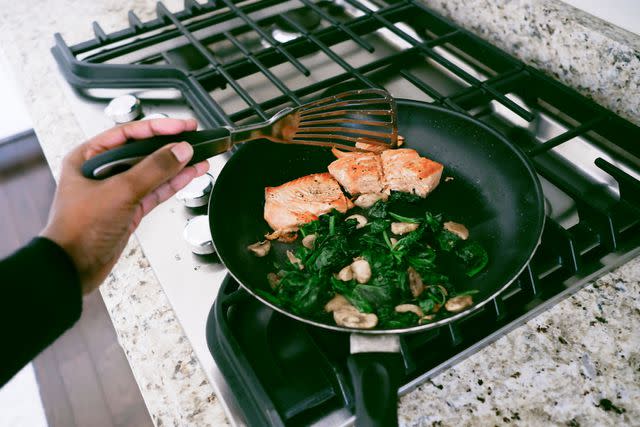Does the Anti-Inflammatory Diet for Psoriasis Help Manage Symptoms?
Medically reviewed by Karina Tolentino, RD
Psoriasis is a chronic autoimmune disease that occurs when an overactive immune system inflames the body and speeds up the growth of skin cells. The cells pile up on the skin’s surface, forming plaques or scales that can itch, burn, or sting.
Because inflammation is an underlying cause of psoriasis, an anti-inflammatory diet may help manage symptoms and prevent flare-ups.
This article discusses the connection between an anti-inflammatory diet and psoriasis, foods to eat and avoid, and how the diet reduces inflammation.

Grace Cary / Getty Images
The Connection Between Psoriasis and Inflammation
Although psoriasis affects the skin, the inflammation that causes the condition is systemic,
meaning it occurs throughout the body on a deeper level than just the skin.
People with mild psoriasis (appearing on less than 3% of the body) can have significant inflammation.
Those with moderate to severe psoriasis have inflammatory markers in the skin, the blood, and bodily fluids like saliva, along with low-level inflammation in other body parts, including the joints, arteries, tendons, and liver.
Takeaway
Plaques and scales from psoriasis can occur anywhere on the body, often on the elbows, knees, and scalp.
What's an Anti-Inflammatory Diet?
An anti-inflammatory diet focuses on eating foods that reduce inflammation while avoiding foods that are known to promote it. Anti-inflammatory diets aren't a diet but an overall pattern of healthy eating, balancing protein, fat, and carbohydrates with a focus on fresh, whole foods that benefit the entire body's health.
Takeaway
Always consult a healthcare provider before making any major changes to your diet. A registered dietitian can help you create a healthy meal plan and provide tips on incorporating anti-inflammatory foods.
How Can an Anti-Inflammatory Diet Help Psoriasis?
Diet plays an important role in managing psoriasis. Anti-inflammatory foods have bioactive compounds such as fiber, antioxidants, and polyphenols that can help reduce chronic, systemic inflammation.
Anti-inflammatory diets also avoid foods that promote inflammation, such as those high in saturated fat or iron. Pro-inflammatory diets are known to negatively impact the immune system and increase systemic inflammation and the severity of inflammatory diseases.
The Anti-Inflammatory Diet for Psoriasis
Psoriasis is related to inflammation. Eating foods that fight inflammation and avoiding those that trigger it might help reduce flare-ups or lessen symptoms. However, it’s important to remember that everyone reacts to individual foods differently, and you should gauge your reaction to recommended foods.
Foods to Eat
Foods to eat on an anti-inflammatory diet for psoriasis include:
Extra virgin olive oil and other monounsaturated oils
Fatty marine fish (salmon, mackerel, tuna, sardines)
Lean protein or plant-based protein like tofu or tempeh
Seeds and nuts, especially walnuts
Unprocessed vegetables and fruits
Foods to Avoid or Limit
Foods to avoid on an anti-inflammatory diet for psoriasis include:
Foods high in saturated fat or trans fat, including red meat, fried food, margarine, fast
food, and many processed snacksFoods high in sugar, such as candy, sweets, and sweetened drinks
Dairy
White bread, pasta, and rice
Potatoes
Foods with gluten
Takeaway
Research shows that low consumption of monounsaturated fatty acid (MUFA), such as extra-virgin olive oil, is the main predictor of the severity of psoriasis. Consuming MUFA might help decrease inflammation in those with psoriasis.
Can Your Diet Clear Up Psoriasis?
There is no permanent cure for psoriasis, but research suggests that eating foods rich in anti-inflammatory nutrients can reduce the severity of the condition. An anti-inflammatory diet can also help lower the risk of developing other psoriasis-related conditions, like psoriatic arthritis.
Can an Anti-Inflammatory Diet Replace Any Current Treatments?
An anti-inflammatory diet is not a cure for psoriasis; no diet is designed to replace medical treatments. Instead, an anti-inflammatory diet can help lessen symptoms and possibly prevent other conditions, such as psoriatic arthritis (PsA), a chronic inflammatory disease affecting the joints and entheses, areas where tissue connects to bone. PsA can occur in some people with psoriasis.
Any diet therapy for psoriasis should be tailored to any medications taken in consultation with a healthcare provider.
What's the Best Way to Get Started on an Anti-Inflammatory Diet?
If you’re beginning an anti-inflammatory diet, starting slowly and not restricting yourself too much is best. You can begin by cutting out one or two unhealthy foods at a time and replacing them with healthier choices, such as exchanging sweets for fresh fruit or sugary soda for water with lemon or herbal tea, then slowly substituting foods.
How to Maintain a Healthy Relationship With Food When Changing Your Diet?`
As you change your diet, keeping a healthy relationship with food is important. Some
tips for doing so include:
Listen to your body, eating only when you are hungry and stopping when you are full.
Practice mindful eating by eating slowly and enjoying each bite.
Focus on the enjoyable smells, textures, and tastes of food.
Don't feel guilty or be critical of yourself if you eat foods you are trying to avoid.
Learn about nutrients in foods, so you know why you should eat or avoid them.
Summary
While there is no permanent cure for psoriasis, eating an anti-inflammatory diet can play a role in reducing symptom severity and flare-ups. If you have psoriasis, consuming foods known to lessen inflammation and avoiding foods that promote inflammation might help you better manage your condition.
When starting an anti-inflammatory diet, it’s important to go slowly, giving yourself time to adjust to changes and maintaining a healthy relationship with food.
Read the original article on Verywell Health.

